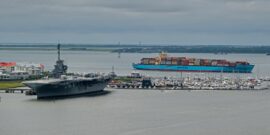American free traders should recognize that it is not enough to win the intellectual argument. They must also mobilize free trade sentiment.
Free Trade as an Instrument of Pax Americana
Free trade not only creates economic benefits but advances the security of the United States. It is clear that today we have become less willing to bring about a Pax Americana though military strength. The disillusion with the results of wars in Afghanistan and Iraq, the sharp cuts to the defense budget, and most of all, the ever growing entitlement state makes it more difficult to project for the long term American force on the world.
But even in the absence of force, free trade can help make the globe safer and the United States more secure. By connecting individuals in different nations through the web of commerce, trade makes war less likely by giving more people a greater stake in avoiding the disruptions of conflict. This insight goes back to Adam Smith and David Hume who celebrated “la douce commerce.” A more modern insight is that democratic nations are less likely to disturb world peace. Given that wealth tends to promote democracy, free trade helps on that front as well. Finally, free trade puts more people in contact with American goods, including its information laden goods, like entertainment. It thus constitutes the most effective form of soft power.
The efficacy of free trade as an alternative mechanism to military strength for maintaining security makes it all the more disappointing that the President Obama is not pressing hard for it, particularly because it is he who has cut the defense budget and done nothing to reform the entitlement state that enervates our capacity to sustain long term military engagements. And free trade is indispensable for the achievement of his own particular policy goals, most importantly the pivot to Asia.
The pivot to Asia is one of the administration’s most sensible policies. With the maturing of the Asian tiger economics and the rise of China the Pacific has become a center for world economic growth. Yet because of the clear and present danger of rogue North Korea and the longer term threat of authoritarian China, American presence is needed to organize the forces of freedom in the Pacific. Those forces are themselves in disarray. South Korea and Japan—the two most important nations other than China—are historical enemies and friction over past wars has created current quarrels. Other nations, like Malaysia and Singapore have long simmering tensions. Thus, the proposed Trans-Pacific Partnership is crucial to help individuals in these nations look forward to what they have in common—joint prosperity—rather than look backwards at old insults. And while the Partnership will not initially include China, the prospect of joining may act as diplomatic carrot to moderate its belligerent and expansionary tendencies.
While the Transatlantic Trade and Investment Partnership with the EU does not have quite the same degree of geopolitical payoff, it also serves a strategic interest– energizing a Europe stuck in economic malaise. Whatever our differences with Old Europe, they pale in comparison with our differences with authoritarian Russian. We have every reason to increase economic growth in the region to attract nations from its sphere of influence and resist its effort to restore the perceived glories of lost empire.


